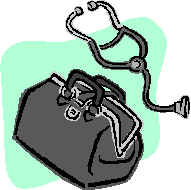Today, the health IT industry is in the early stages of sharing data about what happened. We share a patient’s medical history, test results, diagnosis, care plans, a physician’s notes on the patient’s progress, etc. This sharing across provider organizations has a significant potential to improve the efficiency, safety and quality of care. However, an exciting new frontier is determining how we may one day start sharing information about things that DIDN’T happen.
Today, the health IT industry is in the early stages of sharing data about what happened. We share a patient’s medical history, test results, diagnosis, care plans, a physician’s notes on the patient’s progress, etc. This sharing across provider organizations has a significant potential to improve the efficiency, safety and quality of care. However, an exciting new frontier is determining how we may one day start sharing information about things that DIDN’T happen. It’s a subtle but significant difference because it’s one that could materially further our ability to deliver cost-effective care.
Tracking patient noncompliance will allow us to find opportunities to engage in new ways to manage chronic disease, presumably for the betterment of an individual’s health. Knowing that a patient failed to keep an appointment or was unexpectedly seen in the emergency room will let us know if there have been deviations from the expected plan of care. We can use such data to determine if new or expanded services or care interventions are necessary or if we need to alter an individual’s plan of care. With providers facing penalties for readmission, it will be increasingly more important to understand if it’s the treatment that failed; the discharge plan that failed, or that the patient did not follow through on the plan.
The first wave of baby boomers is eligible for Medicare, a trend that will continue at staggering rates. Many will have chronic conditions that need to be managed in order to prevent more costly interventions. For instance, consider how powerful it would be to follow how a patient complies with maintenance medication to the point where if the patient stops filling the prescription the primary care physician receives a notification. The physician’s staff can then follow up with the patient to determine why he or she stopped filling the prescription. The opportunities to coordinate care in such a manner may seem subtle but can have dramatic impact.
I hope to share more thoughts with you as I learn from the best and the brightest in the industry at HIMSS. And I would also like to introduce Charlene Underwood, who is our senior director of government and industry affairs. Charlene has more than 30 years of experience in the health IT business and sits on committees involved in the formative policies at work behind our nation’s meaningful use of health IT. She is also Chair of the HIMSS Board of Directors for 2012. Charlene will begin blogging on the Healthworks Collective and I look forward to her contributions to this community.









